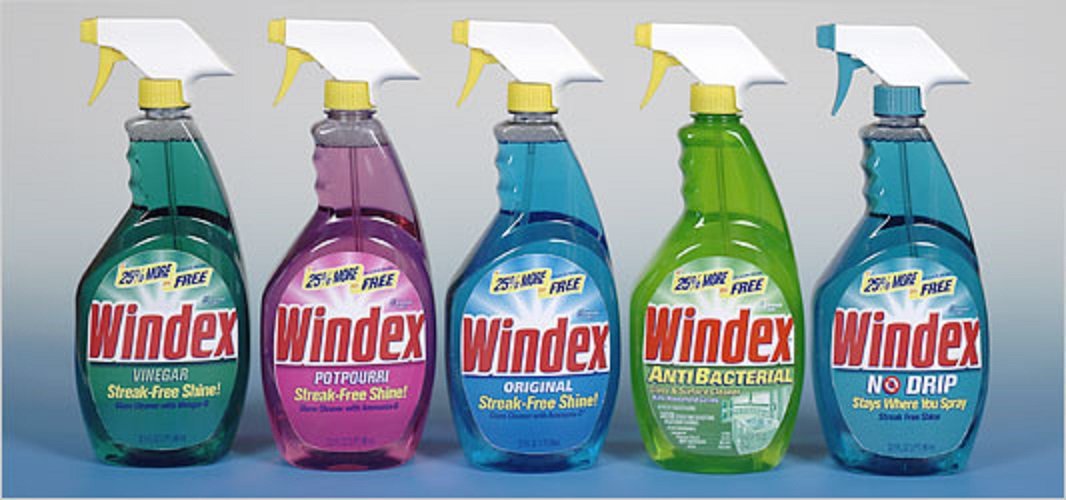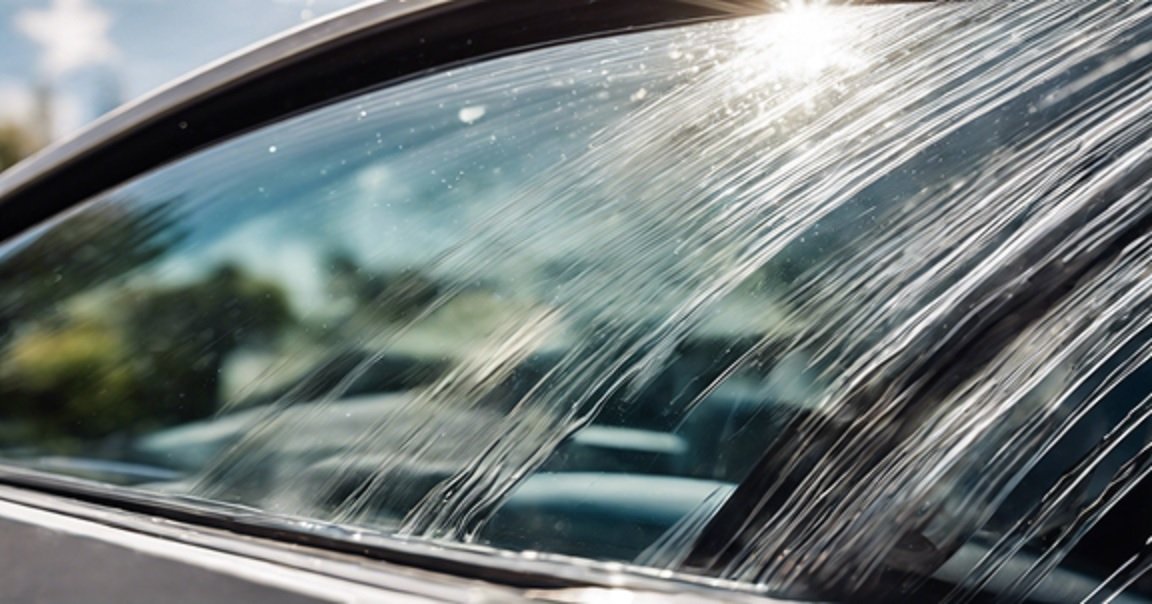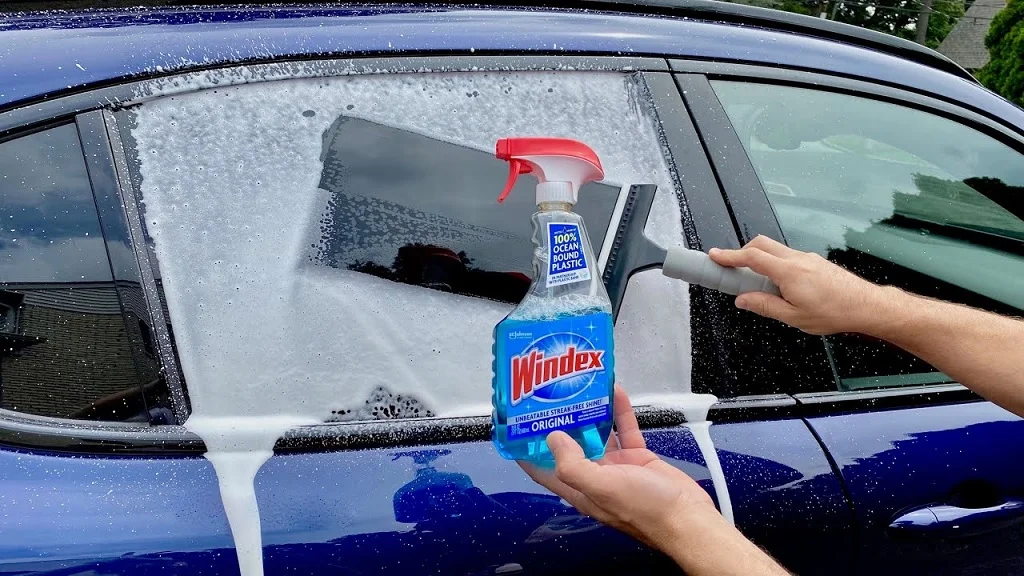Key Takeaways
- You can use Windex on car windows. Just ensure that it doesn’t have ammonia, since that can be damaging to tinted windows.
- Alternatives to Windex include vinegar and water mixtures, alcohol-based cleaners, and specialized automotive glass cleaners for a streak-free finish.
- For best results, clean your car windows in the shade. This will keep the cleaner from evaporating too quickly and help prevent streaks.
- Use a microfiber cloth specifically designed for cleaning so you won’t scratch the screen. You can create a polished, streak-free surface.
- If you’re cleaning interior or tinted windows, opt for ammonia-free and non-abrasive cleaners to avoid damaging the tint and delicate interior finishes.
- When choosing a cleaner for your car windows, pay attention to the type of glass and any tint that may be present. Also consider the environmental conditions to make sure you provide the best care and maintenance.
Over 90% of people who own cars clean their windows, but they’re not all using the right stuff. You may assume Windex is safe to use on your car windows. It’s everywhere and it seems handy, but wait.
Windex can screw up your car’s tint. It has ammonia, which can damage the tint layer and lead to expensive repairs. So what’s your best bet to keep those windows streak-free without screwing up?
Try some auto glass cleaner. It’s made for cars, so you don’t have to worry about it getting damaged. Plus, microfiber cloths are your friend. They pick up dirt without scratches.
Simply spray the cleaner, wipe, and you’re good. Your car windows will shine and keep that tint safe if you need it. Who knew a clean window could be so simple? Happy cleaning!
Can You Use Windex on Car Windows?
1. Assess Windex Ingredients
Windex is a popular household cleaner, likely known for its ammonia-based formula. When it comes to car windows, we have to push down a little bit. The primary ingredients in Windex are ammonia, dyes, and other cleaning agents.
Ammonia is a powerful cleaner, but it’s probably not your car’s surfaces’ best friend. It can be abrasive and could potentially cause damage, especially on tinted windows. Specialized auto glass cleaners have the gentle touch necessary for car surfaces.
Auto glass cleaners tend to be ammonia-free and contain ingredients that are less harsh on the various materials in vehicles.
Here’s a quick rundown:
| Feature | Windex | Auto-Specific Cleaners |
| Ammonia Content | High | Low/None |
| Streak-Free Finish | Often Leaves Streaks | Designed to Be Streak-Free |
| Safe for Tinted Windows | Not Recommended | Safe |
| Suitable for Auto Interiors | Risky | Safe |
2. Understand Ammonia Effects
There’s a little works about ammonia in Windex. Streaking can be a pain, leading to the need for repeated wiping to get those streaks off. If you have third-party tinted windows, ammonia can be really harmful.
It’s known to degrade the tint, causing bubbling or peeling over time. Additionally, accidentally spilling Windex on your car’s leather interiors can damage them. It can dry the leather, leading to cracks.
Opt for ammonia-free cleaners like vinegar and water solutions. You can also use products designed specifically for auto interiors, as they are safe and effective.
3. Consider Risks to Car Surfaces
Using Windex on other surfaces of your car can be risky. The ammonia actually breaks down rubber parts like wiper blades, making them less effective and shortening their lifespan.
If it somehow gets on the paint, you can find some dulling over time. As a rule of thumb, here’s a list of surfaces to avoid with ammonia-based products:
- Rubber seals
- Third-party tinted windows
- Leather interiors
- Car paint
The key is to keep the integrity of the materials, which are essential for the vehicle’s longevity and looks.
4. Evaluate Safety for Auto Glass
Safety is a biggie when it comes to using cleaners on your car. Windex can be viewed as a quick fix to clean windshields and windows, but it’s not the safest choice to make.
Cleaners not designed for use on cars can interfere with driver visibility by leaving streaks and glare. To keep it simple, use products intended for automotive glass. They’re clear, and they don’t sacrifice safety.
Here’s a quick checklist to keep your windows spotless:
- First, wash and dry your car so you don’t drag dirt around.
- Use auto-specific glass cleaners.
- Wipe in circular motions for an even finish.
- Dry with a microfiber cloth to prevent streaking.
Alternatives to Windex for Car Windows
When it comes to keeping your car windows sparkling, selecting the right cleaner is essential. While Windex is a household favorite, it’s not always the best choice for your car. Let’s get into some really great substitutes! They’ll get you that crystal-clear finish without compromising your car’s safety.
Recommended Auto Glass Cleaners
A good place to start is with cleaners made especially for cars. Drivers love Meguiars Glass Cleaner for its powerful effectiveness. Its ammonia-free formula ensures it’s safe for auto glass.
Ammonia-free options are better because they don’t cause fogging or streaking that can happen with ammonia products. They’re also safer for tinted windows. When choosing a cleaner, select one that states it’s intended for automotive use.
This also ensures they’re gentle on tints and won’t damage rubber or trim. You can find these products at auto parts stores, big-box retailers, or online marketplaces. It’s a good idea to compare a couple and read reviews to find the one that works best for you.
Homemade Cleaning Solutions
Homemade cleaners are a good option if you’d rather DIY. A simple mix of vinegar and water can do the trick. Vinegar naturally breaks down grime, so it’s a safe alternative to harsh chemicals.
Plus, it’s really quite affordable. For a basic recipe, combine equal parts distilled water and white vinegar. If you need extra cleaning power, you can even add a few drops of dish soap.
Homemade solutions save you money. With a few common kitchen ingredients, you can replace costly store-bought cleaners with ingredients that you likely already have in your kitchen. Here’s a quick list of what you’ll need for a DIY cleaner:
- White vinegar
- Distilled water
- Dish soap
- Spray bottle
Practical Tips and Considerations
Household glass cleaners are a great way to save money, particularly when diluted. One gallon stretches to eleven gallons of cleaning solution, but that’s a caution. Some say these leave a film, which a Magic Eraser can tidy up.
However, test in a small spot to avoid damage to trim or rubber. Windshield wiper fluid is another affordable choice that you can buy in bulk at dollar stores. It may leave behind water spots if it’s not distilled.
To remove water spots, a glass polishing kit or vinegar soak can be useful.

Best Practices for Cleaning Car Windows
Keeping your car windows clean isn’t just for looks—it’s for safety, too. Clean windows make for better visibility while on the road. Here’s how to get streak-free, spot-free car windows.
Choose the Right Materials
The first step is to get the right tools. Microfiber towels are your best friend here. Unlike ordinary rags, they clean gently without scratching the glass. They do well at picking up dirt and grime and don’t leave behind lint.
Avoid harsh materials, as they will scratch and ruin your windows.
Here’s a quick list of recommended tools:
- Microfiber cloths
- Soft cotton cloths
- Bucket of hot water
- Invisible Glass cleaner
- 70% rubbing alcohol
Use Proper Cleaning Techniques
In fact, how you clean matters as much as what you use. It all starts with washing and drying your car to get off any dirt that could scratch the glass.
Use a microfiber cloth to apply the cleaner with a circular motion. This eliminates streaking. Always clean from the top down. That way, the drips run to already cleaned areas.
Here’s a simple checklist for effective cleaning:
- Wash and dry your car first.
- Use a microfiber cloth with hot water.
- Apply cleaner in circular motions.
- Clean top to bottom.
- Buff dry with a microfiber cloth.
Avoid Common Mistakes
Most people make mistakes that you could easily avoid. Don’t use household cleaners, such as Windex, on car windows, especially those that are tinted. These can mess them up and leave streaks.
Clean your windows in a shaded spot to prevent the sun from drying out your cleaner before you wipe it off, which leaves streaks.
Here’s what to do and not to do:
- Do: Use Invisible Glass for interior films.
- Do: Buff dry before the cleaner dries.
- Don’t: Use Windex on tinted windows.
- Don’t: Clean in direct sunlight.
Cleaning Interior and Tinted Windows
Cleaning tinted car windows can be tricky business. Interior windows can be tricky, and tinted glass requires special attention. While tinted windows offer style and privacy, keeping them looking good requires a little extra care. The tint film can be delicate, so how you clean it is crucial.
There are ammonia-based cleaners, which, for some versions of Windex, damage tint films—something many people don’t realize. So stick to gentle cleaners. A simple mix of vinegar and water is a great option. Alternatively, you can clean with peace of mind by using household items such as microfiber or chamois cloths. Add a drop of dish soap for better results!
Safe Methods for Tinted Glass
Cleaning tinted windows safely is all about the method you use. Always apply it with a soft cloth, such as a microfibre or chamois, so you don’t scratch any surface. Try any cleaner out in a small spot before you commit. This way you can be sure it doesn’t impact the tint.
Use an ammonia-free product and wipe gently to keep your tinted windows in the best shape possible. Be careful not to get excess moisture. Remember that tint takes roughly two weeks to three months to fully cure. During that time, treat it carefully!
Techniques for Interior Windows
When it comes to cleaning the interior of your car windows, there are a few simple tricks to consider. Removing smudges and fingerprints is essential for visibility. You may also wish to check out Invisible Glass, a longtime favorite among users. Using a dedicated inside glass cleaner really helps.
Here’s a quick list of tips: use two microfibre or chamois cloths, one for cleaning and one for drying; avoid fabric softener when washing your cloths to prevent streaks; and always clean in a circular motion for the best results.
- Microfibre or chamois cloths
- Vinegar and water mix
- Invisible Glass Cleaner
- Water mixed with a drop of dish soap (lemon and vinegar-free)
Factors to Consider in Choosing Cleaners
Choosing a cleaner specifically for car windows requires some thought. Don’t run for the nearest bottle of glass cleaner! There are a few important factors to take into consideration to ensure you’re getting the best results. This will help you prevent damage to your car.
Check for Ammonia-Free Options
First, you need to ensure that the cleaner is ammonia-free. Most bottles of Windex contain ammonia, which makes them great for cleaning household windows. However, on car surfaces, they can cause serious damage. Ammonia can damage tinted windows and even cause unsightly results on other areas of your vehicle.
That means it’s best to avoid using Windex on your paint or windows. Plus, ammonia-based cleaners can leave streaks, and no one wants to deal with that after spending forever detailing their car. Fortunately, there are plenty of ammonia-free options available. Watch out for the labels, and Whoosh or Invisible Glass are good brands.
Here’s a quick checklist of brands known for their ammonia-free glass cleaners:
- Whoosh
- Invisible Glass
- Chemical Guys
- Armor All
Look for Streak-Free Formulas
Next, let’s discuss the streak-free formulas. When you’re driving, the last thing you want is a windshield covered in streaks. It’s not just annoying — it’s dangerous because it screws with your visibility. To avoid this, you need a cleaner with a decent formulation that ensures a clear view.
Brands like Invisible Glass are known for streak-free results. Here are some quick tips to make sure you get that perfect finish:
- Use a microfiber towel for wiping.
- Clean in a circular motion to avoid streaks.
- Don’t clean in direct sunlight. It dries the cleaner too fast.
- Wipe off the cleaner quickly to avoid residue.
Comparison Table: Effectiveness and Safety
| Cleaner Brand | Ammonia-Free | Streak-Free | Safe for All Surfaces |
| Whoosh | Yes | Yes | Yes |
| Invisible Glass | Yes | Yes | Yes |
| Chemical Guys | Yes | Yes | Yes |
| Windex (Original) | No | No | No |
Using household cleaners like Windex on cars isn’t a great idea. Try to choose car glass cleaners that are less harmful. You’ll find they can also be useful around the house!

Frequently Asked Questions
Can you use Windex on car windows?
Yes, you can use Windex on car windows. It cleans dirt and grime effectively. Don’t use it on tinted windows, as it can damage the tint.
Are there alternatives to Windex for car windows?
Yes, use vinegar and water, or a specialized automotive glass cleaner. These options are gentle and effective for keeping car windows clear.
What’s the best way to clean car windows?
Use a microfiber cloth and circular motions. This prevents streaks and removes dirt effectively. Clean them in the shade so they don’t dry too fast.
How should I clean tinted or interior windows?
Use a tint-safe cleaner for tinted windows. For indoors, a damp microfiber cloth is plenty. Never use ammonia-based cleaners on tints.
Why consider other cleaners for car windows?
Different cleaners work best for different needs. Some are safer for tints, while others offer streak-free results. Choose based on the specifications of your car and the type of clean you prefer.
Conclusion
For your car windows to shine bright and clear, stay with glass-specific products. Windex will do fine, but it’s not the ideal option, particularly with tinted windows. Try a combination of vinegar and water or a specific auto glass cleaner. These options can save you time and hassle. Keep in mind, a cleaner windshield equals a safer drive. Give your car the care it deserves. Keep those windows clean, and look out. Got questions or tips to share? Dive into the comments and let’s talk!

Rakib Sarwar is an experienced blogger and avid automotive enthusiast with a passion for both cars and motorcycles. With years of industry knowledge, he covers everything from in-depth vehicle and bike reviews to the latest trends, maintenance tips, and cutting-edge technology. Rakib’s blog has become a trusted resource for readers who share his love for all things on wheels, offering them engaging and reliable content that fuels their automotive interests.












